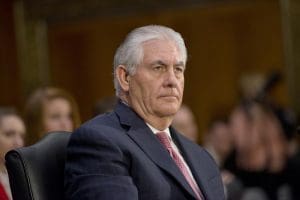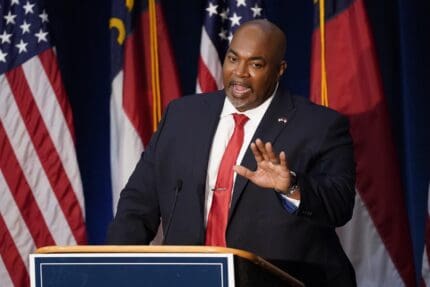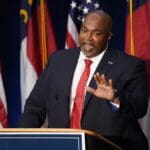Secretary of State nominee's position on China could cause international crisis
Through two days of tough questions during his confirmation hearings as President-elect Donald Trump’s Secretary of State, Rex Tillerson was challenged on his ties to Russia and views on climate change, as well as his opinion of Russian President Vladimir Putin and his human rights record. Many of his responses were concerning to those who […]

Through two days of tough questions during his confirmation hearings as President-elect Donald Trump’s Secretary of State, Rex Tillerson was challenged on his ties to Russia and views on climate change, as well as his opinion of Russian President Vladimir Putin and his human rights record.
Many of his responses were concerning to those who care about protecting our democracy from foreign threats and safeguarding the planet from environmental devastation.
To those grave issues, the New York Times reports, Tillerson has also added concerns about provoking a potential international crisis between the U.S. and China:
Rex W. Tillerson’s call for China to be denied access to its artificial islands in the South China Sea, made Wednesday during his confirmation hearing for secretary of state, set the stage for a possible crisis between the world’s two biggest economies should his comments become official American policy.
Mr. Tillerson told members of the Senate Foreign Relations Committee on Wednesday that China’s multibillion-dollar island-building campaign in the oil-and-gas rich sea was illegal and “akin to Russia’s taking of Crimea.”
“We’re going to have to send China a clear signal that, first, the island-building stops,” Mr. Tillerson told the senators. “And second, your access to those islands also is not going to be allowed.”
The Times notes that Tillerson’s comments were met with “confusion, disbelief and warlike threats” from Chinese analysts.
Yang Chengjun, a retired senior colonel and military expert, warned that “China does not stir up troubles but we are not afraid of them when they come.” And Zhu Feng, the executive director of the China Center for Collaborative Studies of the South China Sea at Nanjing University, wondered if the comments were merely a warning or a more concrete policy indication, and insisted that there would be “no legal basis” to move forward with such a strategy.
Crucially, the Times also points out the unavoidable questions raised by comments such as these coming from someone with Tillerson’s job as the CEO of ExxonMobil:
During his tenure, the company forged close ties to the Vietnamese government, signing an agreement in 2009 with a state-owned firm to drill for oil and gas in two areas in the South China Sea. The agreement with PetroVietnam was signed quietly, according to a leaked United States diplomatic cable, because it conflicted with Chinese territorial claims.
While Exxon Mobil has some operations in China, including a stake in a petrochemical plant in the country’s south, it has a very small presence in the country’s huge retail market for gasoline, which is dominated by state-owned Chinese companies. In contrast, its agreements with Vietnam are potentially huge, given that the South China Sea may contain 11 billion barrels of oil and 190 trillion cubic feet of natural gas, according to the United States Energy Information Administration.
As Reuters notes, the Obama administration has “conducted periodic air and naval patrols to assert the right of free navigation in the South China Sea” which have angered Beijing, but Tillerson’s indications that the Trump administration would “[seek] to blockade China’s man-made islands would be a major step further and a step that Washington has never raised as an option.”
Apparently, that option looks attractive to Tillerson. ExxonMobil already has a lucrative deal with Russian government-owned oil company Rosneft, and Tillerson may be looking for ways to further expand his company’s coffers through the power of the U.S. military, as well as bolster his own influence as the head of a rapidly changing State Department.
Trump has already risked serious damage to our relationship with China, by breaking with decades of U.S. foreign policy to call the President of Taiwan; by indicating his disdain for the “One China” policy; and by naming someone to head his new White House National Trade Council who is extremely antagonistic toward China.
Now the next likely top diplomat in the U.S. seems ready to add fuel to that international fire.
Recommended

Republican Jay Ashcroft backs anti-abortion clinics that push lies and disinformation
The Republic Pregnancy Resource Center website provides step-by-step directions from local middle and high schools to their address.
By Jesse Valentine - May 14, 2024
More than half of Republican Jay Ashcroft’s funding comes from outside Missouri
Ashcroft has criticized other campaigns for relying on out-of-state donors
By Jesse Valentine - April 25, 2024
Battleground GOP candidates rally around Trump’s tax cuts for the rich
Even Larry Hogan, a Trump critic, supports the former president’s tax policy.
By Jesse Valentine - April 12, 2024

















































































